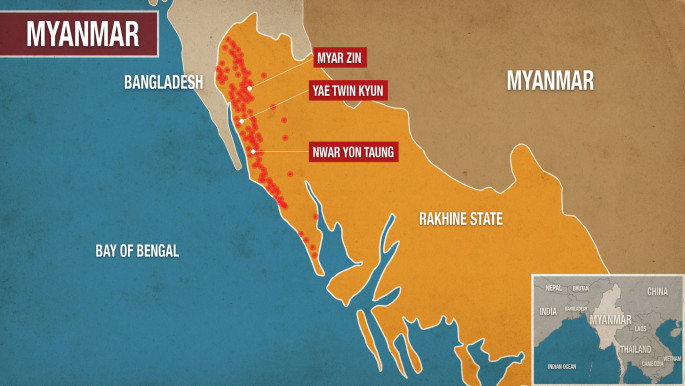Rohingya ethnic cleansing ongoing despite Myanmar denials: Amnesty
Myanmar's campaign against the Muslim Rohingya population in Rakhine state is far from over, Amnesty International said on Wednesday.
The human rights group published new evidence of ongoing atrocities forcing hundreds more people to flee since the beginning of the year.
Men and women who had newly arrived at refugee camps in Bangladesh were interviewed and described how forced starvation, abductions and looting of property drove them to flee their homes.
Many days still see scores of people crossing the border.
"Shielded by official denials and lies, and a concerted effort to deny access to independent investigators, Myanmar's military continues to get away with crimes against humanity," said Matthew Wells, senior crisis advisor at Amnesty International.
"Myanmar's security forces are building on entrenched patterns of abuse to silently squeeze out the country as many of the remaining Rohingya as possible.
"Without more effective international action, this ethnic cleansing campaign will continue its disastrous march."
Amnesty's report described the campaign as designed to make northern Rakhine State "unliveable".
Around 688,000 Rohingya have fled to Bangladesh since August last year, after Myanmar launched a military operation against the long-marginalised Muslim population.
Myanmar accused an armed group, the Arakan Rohingya Salvation Army (ARSA), of attacking around 30 security force outposts.
Crimes allegedly committed by the military include the killing of women, men and children; rape and other forms of sexual violence against women and girls; mass deportation; and the systemtic burning of villages.
Forced starvation
The new arrivals told Amnesty the military's persistent persecution broke their resolve, forcing them to join the exodus to Bangladesh.
Almost all of them blamed the Myanmar authorities' forced starvation of remaining Rohingya communities for creating acute food insecurity.
Many said the breaking point came when the military denied access to their rice fields at harvest time. Myanmar security forces have also participated in - or facilitated - the theft of Rohingya livestock and have burned several local markets and denied access to others.
The Myanmar authorities have further worsened the food insecurity by severely restricting humanitarian assistance to northern Rakhine State, the Amnesty report said.
Fleeing Rohingya have also been subjected to systematic thefts at checkpoints, losing their money, clothes and gold to security forces.
"The extent and range of these ongoing attacks in northern Rakhine State show how Myanmar's military continues to assault and undermine not just individuals, but the dignity of the Rohingya population as a whole. This lays bare why plans for organised repatriation are woefully premature," Wells said, referring to the deal in late November which would see Rohingya returned to Myanmar from Bangladesh.
Wells added the international community has "failed to grasp the severity" of the situation and called for an arms embargo and targeted sanctions as well as humanitarian access.
 |
|
![Rohingya [Getty] Rohingya [Getty]](/sites/default/files/styles/large_16_9/public/media/images/37515486-9693-429C-A690-ABFD4B322EDA.jpg?h=d1cb525d&itok=u3Oo561R)

![President Pezeshkian has denounced Israel's attacks on Lebanon [Getty]](/sites/default/files/styles/image_684x385/public/2173482924.jpeg?h=a5f2f23a&itok=q3evVtko)



 Follow the Middle East's top stories in English at The New Arab on Google News
Follow the Middle East's top stories in English at The New Arab on Google News


